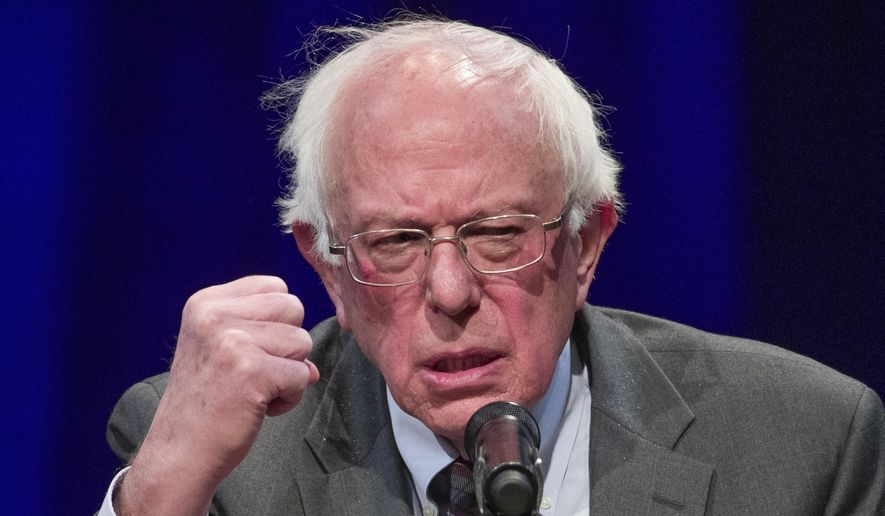Liberal lawmakers released a package of bills Thursday designed to test Washington’s appetite for novel ways to control runaway drug costs, saying U.S. consumers are getting stiffed by prices that are far higher than what other countries pay.
“Not even close,” said Sen. Bernie Sanders, Vermont independent. “That has got to end, and the legislation we are supporting will do just that.”
Mr. Sanders and House allies say U.S. consumers should be able to import drugs from Canada, an idea that drew renewed support this week from a powerful Senate Republican chairman.
The liberal lawmakers also are pushing to let Medicare negotiate the cost of prescription drugs, which the GOP is less likely to embrace but will remain a progressive talking point heading into 2020.
Mr. Sanders cited research that estimates Medicare could save nearly $360 billion over 10 years by negotiating prices down to what Canadians typically pay.
Voters in both parties say soaring drug prices are a worry, and President Trump has vowed action.
Democrats are hoping they can find rare common ground with him.
“During his campaign, he said that he was going to stop the pharmaceutical companies from, quote, ’Getting away with murder,’” Mr. Sanders said. “Today I say to President Trump: If you are serious about lowering prescription drug costs in this country, support our legislation and get your Republican colleagues on board.”
Mr. Trump used his bully pulpit to pressure companies to freeze price increases last summer. But with the new year, companies went back to business as usual, and Democrats said tougher steps are needed.
“No more talk, no more tweet,” said Rep. Elijah Cummings, Maryland Democrat. “No more commotion — emotion and no results. American people want action.”
The president is implementing a “drug pricing blueprint” to bring down costs, though some of his boldest proposals haven’t taken root. They include forcing drug companies to disclose their list prices in TV ads and making sure U.S. consumers pay only 26 percent more than other developed countries do for doctor-administered drugs under Medicare.
An advocacy group called Patients for Affordable Drugs Now started a $1 million ad campaign Thursday in support of Mr. Trump’s international pricing index.
The campaign, which will feature digital ads and videos with patients on sites such as Facebook and YouTube, will roll out nationwide.
Mr. Sanders and Rep. Ro Khanna of California riff on the international pricing concept in their Prescription Drug Price Relief Act, which would break up a drug company’s monopoly if it refuses to offer the same prices to Americans that Germany, Japan and other developed countries enjoy.
The plan would apply to all brand-name drugs at the retail counter, not just those administered in hospitals and doctor’s offices.
The pharmaceutical lobby opposes that idea as well as attempts to let Medicare negotiate costs, saying the imposition of “price controls” would stifle innovation in the U.S.
Senate Finance Chairman Chuck Grassley, Iowa Republican, says he’s uncomfortable with using Medicare Part D to set prices and he doesn’t want foreign nations to set U.S. costs.
Yet he’s open to other new ideas.
On Thursday, Mr. Grassley and Sen. Amy Klobuchar, Minnesota Democrat, filed a bill that would crack down on pay-for-delay deals in which brand-name drug makers pay generic competitors to keep their products off the market.
They also filed a bill that would allow importation of drugs from approved pharmacies in Canada, though Mr. Grassley’s office characterized it as having “more safeguards” than the bill touted by liberals Thursday.
Sen. Jeanne Shaheen, New Hampshire Democrat, attacked high prices from another angle, saying drug makers should no longer be able to deduct the cost of advertising expenses from their federal taxes.
She said rampant advertising increases demand, resulting in higher prices.
“Drug companies continue to increase advertising spending year after year, inundating the airwaves with billions of dollars of commercials, all the while continuing to increase the price of medications that patients need,” Mrs. Shaheen said. “The American public shouldn’t be subsidizing Big Pharma’s ads, which is why my legislation would close this egregious loophole.”
• Tom Howell Jr. can be reached at thowell@washingtontimes.com.




Please read our comment policy before commenting.